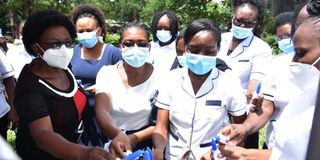Premium
Hefty bills raise risks of Covid-19 deaths at home

Mombasa County nurses light candles on Thursday during the burial of their colleague, Ms Margaret Ngeti, a nurse at Port Reitz Hospital, who succumbed to Covid-19.
What you need to know:
- With the heroes who are taking care of the patients falling and dying every day, some of them cannot take care of their bills.
- For public hospitals, testing is between S3,000 to Sh5,000. However, most of them no longer conduct walk-in tests.
Health workers are being forced to fundraise for at least 50 of their colleagues infected with Covid-19, amid increasing coronavirus cases and financial constraints occasioned by a tanking economy.
With the government no longer footing the bills for the coronavirus patients and insurers such as the National Hospital Insurance Fund (NHIF) declining to pay, some patients who could have been saved are dying of the virus.
With the fear of racking up heavy medical bills and the concerns about costs, many Kenyans are keeping away from seeking Covid-19 treatment.
“When you are unwell, and you know very well that you don’t have the money to clear the bills, why would you take yourself to the hospital? Most of them are dying at home without being traced,” said Kenya National Union of Nurses deputy secretary-general Maurice Opetu.

With the increase in the number of infections and deaths, Kenyans have been left on their own, with the government only preaching precautionary measures without offering any solution, no provision of masks and now everyone has to take care of their hospital bills.
Admission
With the heroes who are taking care of the patients falling and dying every day, some of them cannot take care of their bills. They struggle to get admission in high-end hospitals, yet they work there, where does this leave a common mwananchi who lives on a dollar per day?
Emotionally narrating this to the Sunday Nation, Mr Opetu said the government had abandoned its healthcare workers who are risking their lives to attend to Kenyans. “You might think that doctors are rich people. Wait until you see some of their payslips, they are surviving on loans and if the insurance cannot take care of their bills, then definitely they are left to die,” he said.
Mr Opetu said one of them had difficulty breathing, she was rushed to a private hospital in Kisumu, but the management refused to admit her until they made a down payment of Sh100,000. It was not accepting any insurance card.
After 30 minutes pleading to no avail, she was taken to a public hospital. However, she succumbed on her way to Jaramogi Oginga Odinga Teaching and Referral Hospital. “It is unfortunate that the same hospital that you work in cannot admit you when you are ill yet you are giving your best attending to Kenyans. How about Kenyans who are not employed and fell ill. The government has abandoned us. It is saddening,” said Mr Opetu.
High fever
Michael Onyango, a farmer in Muhoroni, experienced Covid-19 symptoms — high fever and difficulty in breathing — and he was rushed to the hospital. When they got to the hospital, the medics suspected Covid-19.
However, he did not receive a test for the virus. The reason, he did not have a down payment of Sh100, 000 before admission to the hospital.
The hospital was not accepting NHIF cards, which was the only insurance cover Mr Onyango had. They rushed to another hospital where the family paid the Sh30,000 that they had. For testing, they paid Sh7, 000.
Private hospitals charge between Sh6,000 and Sh10,000 for Covid-19 testing while treatment depends on the number of days and the services given. For public hospitals, testing is between S3,000 to Sh5,000. However, most of them no longer conduct walk-in test s.
After 24 hours, Mr Onyango’s Covid-19 results were out, he tested positive. He later developed serious breathing complications and was admitted in the intensive care unit.
For only seven days, the bill had shot to Sh500,000. He is out of danger. However, the family is struggling to fundraise to meet the hospital bill.





